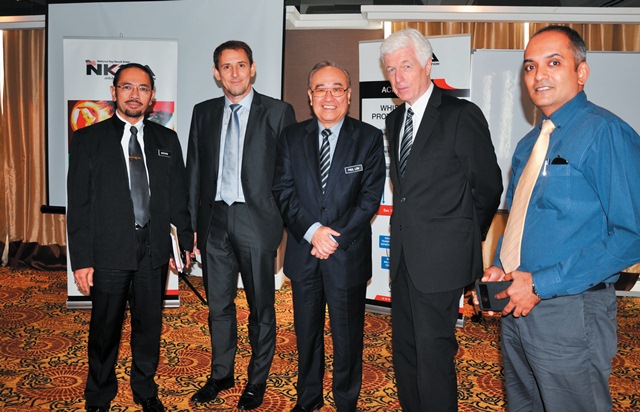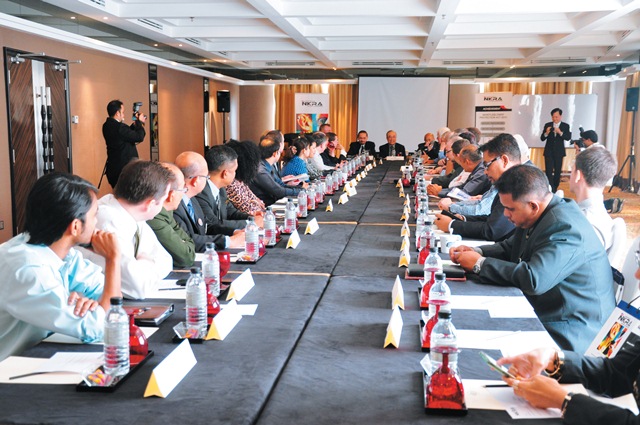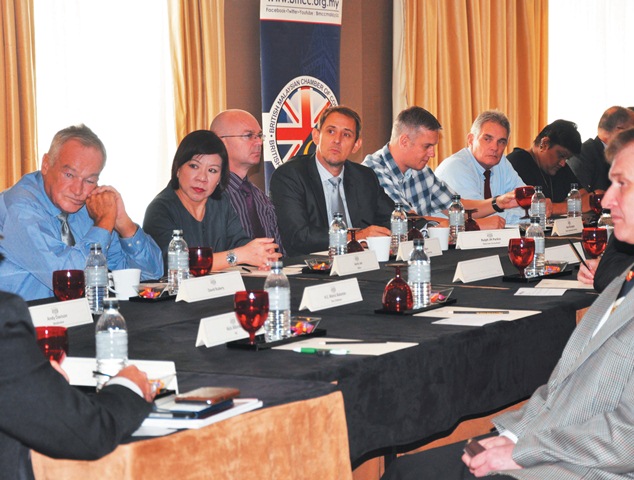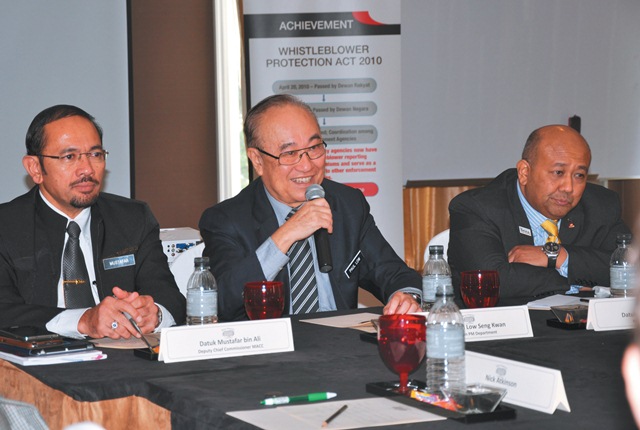
The Expat Group and NKRA Against Corruption recently hosted a roundtable discussion event attended by leaders in the business community, key government officials, and foreign dignitaries assembled to learn more about their progress fighting corruption, as well as to invite the input of expats and diplomats on this important topic. Editor Chad Merchant attended, and reports here.
Moderated by The Expat Group CEO Andrew Davison, and led by a panel of key government officials consisting of YB Senator Datuk Paul Low Seng Kuan, Minister in the Prime Minister’s Department; YBhg. Datuk Mustafar bin Ali, Deputy Chief Commissioner (Prevention), MACC; and YBhg. Datuk Hisham bin Nordin, Director, NKRA Against Corruption, a half-day event was held at The Majestic Hotel in Kuala Lumpur in which CEOs and other senior managers from companies doing business were able to engage in a frank and open discussion with government officials about corruption in Malaysia and what is being done to combat it. The roundtable event was also attended by a number of Ambassadors and High Commissioners, as well.
Such dialogue is not only desirable, but is in fact considered of serious importance by the Malaysian government, as there is keen awareness that a proliferation of corruption in any country seriously discourages foreign investment and ultimately keeps the country from progressing economically and, in some ways, socially. The Malaysian government has demonstrated both a very real commitment to fighting corruption and also a keen desire to engage the expat community on this issue, as well.

In opening remarks, Datuk Paul Low, who as a minister in the Prime Minister’s department spearheads the newly created Governance and Integrity division, and NKRA Director Dato’ Hisham Nordin each affirmed their clear understanding of both the importance of the fight against corruption and the magnitude of the challenge. “For over 50 years, Malaysia has effectively had only one government,” Datuk Paul said, “so there are entrenched interests and deeprooted habits in the culture. That’s what we face.” He added that one important fact actually made their job somewhat easier, and that was pressure from the people. Malaysians, while largely sceptical of any real change taking place, are increasingly speaking out about corruption. “Political will has to be there,” Datuk Paul explained, “but social demand drives that will. Malaysia’s government is now feeling the pressure to address corruption in a very real way, from the top down.”
The panellists explained that in order for this societal evolution to take place, and to shift Malaysia from welfare politics to principle politics, the first order of business is strengthening the institutions tasked with identifying, enforcing, and prosecuting corruption. That means the Malaysian Anti-Corruption Commission (MACC), the Royal Malaysian Police, the Auditor General, the judiciary, and even the laws themselves – all must be fortified to give the fight against graft the best chance for long-term success.
Many expat business leaders seized the opportunity to have this uncommon face-to-face dialog directly with the very people in Malaysia’s government who have been tasked with leading this crusade against corruption. A few Malaysian business officers were also on hand to lend their ideas and ask questions, too. One of the consistent themes offered by expats taking the microphone was that they truly considered Malaysia their home away from home, and felt strongly about taking steps to improve it. Whether business owners, long-time expats, or even married to Malaysians, the expats in attendance all expressed their vested interest in building a better Malaysia. Ralph JH Parkin of Halcrow stressed, “I love this country, problems and all, and I want to be part of the change that’s taking place here.” Mr Parkin, like several others, noted that there is a serious perception problem when it comes to the anticorruption effort in Malaysia, and that this perception disconnect actually informs reality. “People don’t see the effort or the results coming from that effort,” one expat said, “so they don’t think anything is changing.”

Another key point made by more than one participant was that people “really need to see some heads roll” with regards to enforcement and prosecution. Malaysians in particular are well-aware of high-ranking people who have “gotten away” with serious matters, and those in attendance at the roundtable felt that the needle on the perception meter would be shifted meaningfully in a positive direction by seeing real punitive action taken against those found guilty of corrupt practices. On point, Datuk Mustafar Ali, the deputy chief commissioner of the MACC, mentioned a recent occurrence of several politicians being charged. Of 15 charged, fully 13 were members of the current government, with the remaining two belonging to the opposition. Attendees felt that something like this should be made very public to not only show that the MACC is doing its job, but to underscore that no one is above the law. Further echoing the point, Jacey Lee of Ogilvy stressed that agencies tasked with combatting corruption in Malaysia simply must do a better job of disseminating information in order to improve perception among Malaysians, resident expats, and those overseas who might be considering investing in Malaysia. Building on her themes, Philippe O. Piette of Lord Paulett also noted that Malaysia is a good country, but that it seems to have an inferiority complex when comparing itself to other countries.
A corrupt and ineffective police force was a problem raised by quite a few people, along with what John Preston of Intermovers viewed as Malaysians having “a general disrespect for law.” Several others agreed with him, noting that police in Malaysia were not respected, viewed as ineffective and ill-trained, and underpaid in light of the service they provide, perhaps the latter contributing to their widely known tendency to openly seek payoffs and bribes during traffic stops.
“Government needs to be more responsive,” Datuk Paul agreed. “It needs to put forth a better face and deliver a stronger message.” As the two other panellists added, “Malaysia is quite good when it comes to having good intentions and crafting policies, but disappointingly poor when it comes to execution and communication.”

All in all, everyone in attendance felt the roundtable discussion was constructive and fruitful, giving the MACC and NKRA the opportunity to share its many positive accomplishments while genuinely listening to frank concerns and suggestions from the international business community. The lengthy roundtable discussion was followed by a delicious buffet lunch in The Majestic’s Contango restaurant and many of the conversations begun upstairs continued over the meal. A very sincere thanks to all those who took time out of their day to attend and contribute to this event.
Read more:
- An Afternoon with the Mexican Ambassador to Malaysia
- Understanding the Goods and Services Tax (GST) in Malaysia
- 20 Types of Property You Can Buy in KL and Selangor for RM2 Million and Above
What are your thoughts on this article? Let us know by commenting below. No registration needed.
Source: The Expat Magazine November 2014
"ExpatGo welcomes and encourages comments, input, and divergent opinions. However, we kindly request that you use suitable language in your comments, and refrain from any sort of personal attack, hate speech, or disparaging rhetoric. Comments not in line with this are subject to removal from the site. "




















